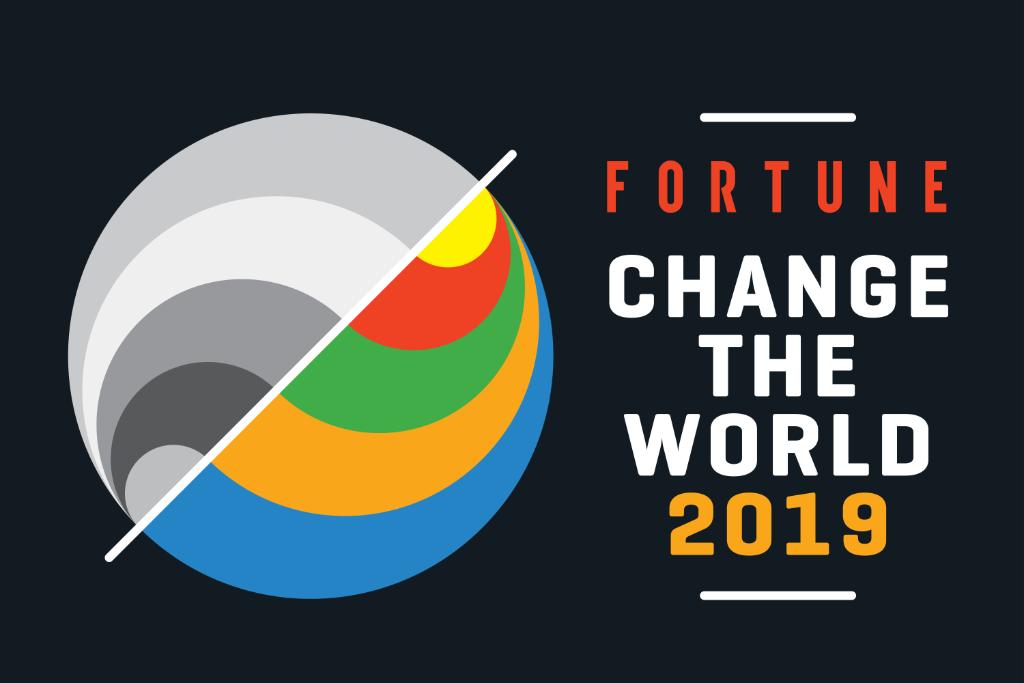Every year, Fortune features the top companies that are creating a positive impact in the world. Discover the most inspiring initiatives that have been promoted in this year’s Change the World List.
Recently, Fortune released its 2019 Change the World List, featuring 52 companies that are using creative tools of business to meet society’s unmet needs while they keep gaining and delivering value to shareholders.
Since that’s not an easy task, most of the companies on the list are relatively large, making a minimum of $1 billion in annual revenue. Alibaba, EY, JP Morgan Chase, IBM, Schneider Electric and Walmart are some of the companies that have been on the Change the World list for all of its five years of existence.
Let’s take a look at the segments that companies in this list are making an impact in, and how they are aligning their core business activities to creating a positive impact on the world.
Environmental action
This segment is related to any environmental innovation, resource use, and efforts to limit emissions. Recent events, such as the Amazonian fires and the death of the first Icelandic glacier, are evidence that climate change is getting to a point where taking action is crucial and every attempt made can make an impact. Corporate efforts to fight this problem are a key factor to take into account when deciding who makes it into the list.
Consequently, 18 of the companies were recognized primarily for their impact on environmental and climate issues. For example, the American brand Patagonia is making 69% of its clothes from recycled materials. In this way, the company is reducing waste and reusing their resources.
Phillips is using renewable sources for its energy consumption from its wind farms in the U.S. and the Netherlands and aims to be carbon-neutral by 2020. In order to achieve this, the Dutch company is reusing all its expired equipment to create refurbished products, as an effort to cut waste to zero.

Public Health & Nutrition Contribution
Especially in developing countries, insufficient public health and the high rates of malnutrition can be alarming. Accenture, the leading technology and consultancy company, has just partnered with the nonprofit Amref Health Africa and developed LEAP, an app to teach people to deal with initial medical testing and how and where to treat common health issues. Although people don’t need to be doctors and nurses to access the app, now more than 35,000 trained health workers in Kenya are considered to be health advisors, creating an impact in more than 3 million families.
Lloyds Banking Group is another company making a health impact on a much smaller scale, but no less relevant in society. After becoming aware that a high percentage of its clients experienced stress and mental health challenges caused by money issues, they introduced a training program for 500 of its staff to make them into mental health advocates. The British financial group also now offers a counseling service that guides its clients through better practices to save money and to avoid making money mistakes.
Human Rights & Social Justice Advocates
Facilitating solutions for social problems is another way in which companies can contribute. Intel’s initiative is an example of this. The American technology company is focusing on embracing diversity by having an admirable 14.6% of underrepresented minorities in its total number of employees. It has also committed to spending $1 billion on suppliers owned by women, minorities, veterans, LGBTQ, and disabled people.
Vinte, a Mexican real estate company, is also acting to help a social problem by providing more affordable houses for Mexico’s middle class. Vinte has been able to achieve this by building homes with solar panels and thermal insulation, which reduces electricity costs. So far, 40,000 houses have been sold and the next step will be expanding to hospitals and schools.
Education & Discovery Facilitator
If you were wondering why Walmart has been listed for five years in a row, it is because of its strong belief in how education can be a powerful tool. This year, the company was chosen for its academic program and Live Better U initiative that is giving its employees (or associates as they call them) debt-free college degrees for $1 per day.
When it comes to making education more accessible, Duolingo has been a real facilitator for people looking to learn a new language but without the resources to take classes. It now offers interactive online courses in 36 languages and 28 million people are already learning thanks to this free app.

Providing Economic Opportunities & Financial Inclusion
Technology has proven to be capable of many things, including making a better and inclusive financial network to make economies stronger. When Santander Brasil first introduced its Prospera microloan program in 2002, the process to approve small low-interest loans to entrepreneurs regardless of their income level (a quarter of whom live below the poverty line) took 10 days, limiting the number of people who benefited from the program. In 2018, it included tech to speed the process and the number of benefits in that year increased by 50%. The bank expects to grow to 90% by the end of this year. Even better than that: data shows that Prospera loans have helped more than 700,000 entrepreneurs so far.
Moreover, Mastercard is working to include 500 million people into a digital financial system. The global financial company established the first chamber of commerce in India to help rural women. In less than six months, Mastercard has provided access to credit and training in marketing and financial subjects to more than 5,000 women.
However, changing the world is not exclusive for companies with revenues above $1 billion. Any for-profit company with services or products can take corporate citizenship seriously and leverage a positive effect on the lives of others by contributing to social challenges. In fact, the United Nations Global Compact, the world’s largest corporate sustainability initiative, has more than 20,000 worldwide participants, of which 13,000 are corporates committed to upholding their basic responsibilities to people and the planet.
So, regardless of the size of your company, you can start aligning your core business to make the world a better place. Whether it is recognized on a list or not, what matters is that you are truly making a contribution to the world.




